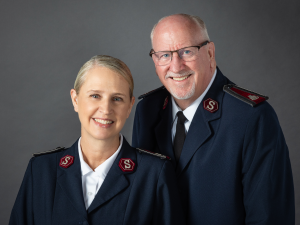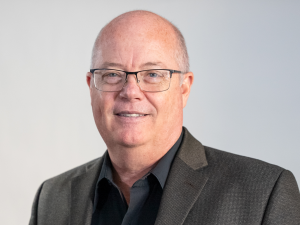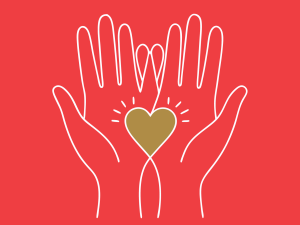I vividly remember my first real reporting outing as an intern. I met Jill, who lived in a Salvation Army shelter for families experiencing homelessness and HIV/AIDS in Los Angeles. Jill told me about the moment she learned she was positive—and pregnant. The baby would be born infected.
Jill showed me the four vials of antiretroviral medication her daughter, then 2, had to take each day. She also gave me a tour of the apartment, their home, with visible pride over her child playing in the toy kitchen. Despite the hurdles, Jill became a mom and it changed her for good. She had a new story to write.
Before I left, Jill thanked me for letting her tell her story, saying it felt good to share.
As I’ve sat down with people in the 15 years since, I’ve heard the same sentiment again and again.
It’s when we name our experiences that we come to understand them in a new way—especially our own. More importantly, stories help us to understand each other, to see past any label and instead see the person.
On this episode of the Do Gooders Podcast, we’re going to talk about story and why it’s so powerful.
Listen and subscribe to the Do Gooders Podcast now. Below is a transcript of the episode, edited for readability. For more information on the people and ideas in the episode, see the links at the bottom of this post.
* * *
“The story—from Rumpelstiltskin to War and Peace—is one of the basic tools invented by the mind of man, for the purpose of gaining understanding,” wrote Ursula K. Le Guin in The Language of the Night. It’s a “symbiotic exchange,” one we learn to negotiate in infancy. We even look for a story when it’s not there, as found in a 1944 study of college students shown a short film of moving shapes. When asked what was happening, all but one participant came up with a story to explain what the movements were about.
It’s thanks to the principles of narrative transportation that you will care more about an issue through the lens of someone experiencing it than through any statistic you might learn.
In Salvation Army storytelling, we could tell you that more than 550,000 people are homeless on any given night in America. But we’d rather introduce you to Chris Christian, who went from lawyer to living on the streets to the doors of The Salvation Army. He can show you what it’s really like to be without a home and what it means to him to now work in street outreach.
We could tell you that some 6,500 people are hospitalized for substance abuse every day in the U.S. But we’d rather introduce you to Thomas Wolf, who lost his home, job and family after he became addicted to painkillers as a result of a surgery. He can show you what it’s really like to experience addiction, how he found a way out and got his family back.
We could tell you the number of young people who seek Christ in The Salvation Army in a given year. But we’d rather introduce you to Mechale Mency, who attended summer camp with The Salvation Army in the late 1970s, three years in a row. She can show you what it’s really like to meet Jesus at camp and how—some 40 years later—it has shaped who she is. She’ll share what it was like to be around people of different skin color for the first time and how the experience she had at camp made her want to be an experience for others now as an elementary school principal, to make sure kids feel seen and valued, and learn to value others—just as she did at camp.
In storytelling, the principle is: Show, don’t tell. And when it’s done well, you won’t only hear the story, you’ll feel it.
In recent years, Caring Magazine—which produces this podcast—has embraced an expanding digital presence in favor of showing over telling, of bringing you the voices of those impacted by The Salvation Army, of building awareness and deepening engagement. We’re doing it through multi-platform storytelling to draw your attention to the issues at hand, to evidence The Salvation Army’s impact in your community and to introduce you to the voices that will make you feel something in text, podcast or video.
And it doesn’t end with the story—the digital environment allows us to continually extend you an invitation to engage.
When you land on an article about how the Portland Female Emergency Shelter expanded meal service to the community during the pandemic, we’ll invite you to join the Caring Moms Collective, a place of low-pressure, high-encouragement love and support for moms anytime you need it, whether you know it or not.
When you learn how The Salvation Army partnered with the University of Nevada, Las Vegas to impact the care of human trafficking survivors, we’ll invite you to take a “What’s Your Cause” quiz to discover what area of Salvation Army service best fits your personality and how you can join in today.
When you hear how The Salvation Army is hosting an adaptive summer camp for young adults with disabilities, we’ll invite you to an “elective” of your own—an email workshop to help you find your own story.
When you understand what led two soon-to-be officers to a life of service with The Salvation Army, we’ll invite you to study Scripture with us.
When you find an article about how The Salvation Army is expanding its efforts to reach more people living in cars, we’ll invite you to learn how The Salvation Army fights homelessness and give to the effort.
As a Google News Publisher, we aim for any story to be search-engine friendly so those unfamiliar with the work of The Salvation Army can find us, learn more and get engaged. When you do opt-in and give us your email address, you receive a five-part welcome sequence followed by a weekly email (the “Do Good Digest”) as we make an effort to further connect with you, tell you more about The Salvation Army, invite you to join in a way that might interest you and to simply be an encouraging, friendly voice in your inbox.
As one reader said: “Caring is a constant reminder that we all matter and make a difference in others’ lives.”
We want any visitor—including you—to come away feeling encouraged that you can be the reason somebody believes in goodness. You can be what points them to a community of love, and ultimately to the source of love in Jesus.
Which brings me to a final question for you: What is your story? What is the heart of your story? Have you shared it with anyone?
If you’re not sure where to find it, look for the transformation in your own life.
When the protagonist, the “hero” of the story (you!), wants something and faces a trial, frustration or conflict that leads to a turning point, that shapes the character so they can no longer see things the same way as before. That’s where the magic is.
The events of your life mark the timeline, but their meaning shape your story—who you are, where you’re going, what you have to pass on. When we share it, chances are someone will recognize those themes in their life, too.
As memoirist Patricia Hampl said: “For we do not, after all, simply have experience; we are entrusted with it. We must do something—make something—with it. A story, we sense is the only possible habitation for the burden of our witnessing.”
So…What have you witnessed?
And who will you tell?
If you want to know more, consider this your personal invitation to join our free email course to find your story today. Tell people who you are, what you’re passionate about and why you care. Find confidence, healing or simply the satisfaction of finding your voice, owning your story and sharing it with others. Get started today at caringmagazine.org/story. You’re the only one who can tell your unique story.
Additional resources:
- Get on the list for Good Words from the Good Word and get a boost of inspiration in 1 minute a day with a daily affirmation from Scripture sent straight to your inbox. It’s an email to help you start your day with goodness.
- You’ve probably seen the red kettles and thrift stores, and while we’re rightfully well known for both…The Salvation Army is so much more than red kettles and thrift stores. So who are we? What do we do? Where? Right this way for Salvation Army 101.
- Get inside the Caring Magazine Scripture Study Collection and find a suite of free, downloadable Bible studies to guide you through topics from New Beginnings Through Forgiveness, to Understanding our Imago Dei or Life Hacks From David.
Listen and subscribe to the Do Gooders Podcast now.











